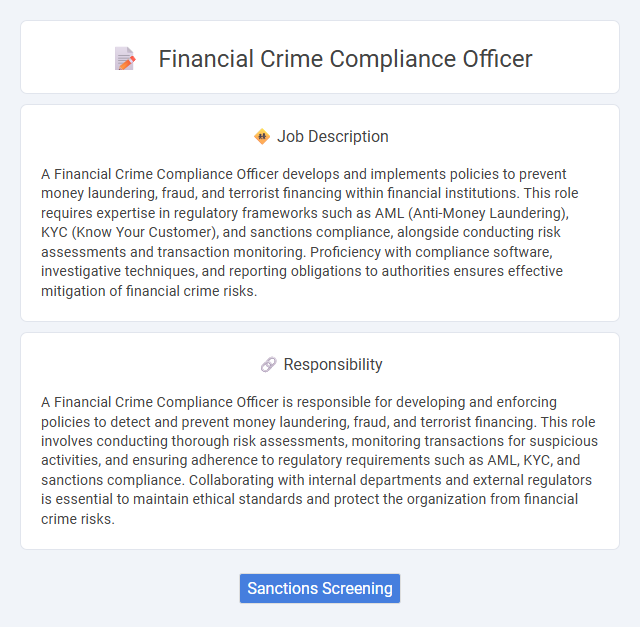
A Financial Crime Compliance Officer develops and implements policies to prevent money laundering, fraud, and terrorist financing within financial institutions. This role requires expertise in regulatory frameworks such as AML (Anti-Money Laundering), KYC (Know Your Customer), and sanctions compliance, alongside conducting risk assessments and transaction monitoring. Proficiency with compliance software, investigative techniques, and reporting obligations to authorities ensures effective mitigation of financial crime risks.
Individuals with strong analytical skills, attention to detail, and a high level of integrity are likely suitable for a Financial Crime Compliance Officer role. Those who thrive in environments requiring vigilance, ethical judgment, and the ability to interpret complex regulations may find the position well-aligned with their capabilities. Conversely, people who struggle with regulatory frameworks or prefer less structured tasks might face challenges in this role.
Qualification
A Financial Crime Compliance Officer typically requires a bachelor's degree in finance, law, or a related field, alongside professional certifications such as CAMS (Certified Anti-Money Laundering Specialist) or ICA International Diploma in Anti Money Laundering. Expertise in regulatory frameworks like AML (Anti-Money Laundering), KYC (Know Your Customer), and CFT (Counter Financing of Terrorism) is critical. Strong analytical skills, attention to detail, and experience with risk assessments and compliance monitoring tools are essential qualifications for this role.
Responsibility
A Financial Crime Compliance Officer is responsible for developing and enforcing policies to detect and prevent money laundering, fraud, and terrorist financing. This role involves conducting thorough risk assessments, monitoring transactions for suspicious activities, and ensuring adherence to regulatory requirements such as AML, KYC, and sanctions compliance. Collaborating with internal departments and external regulators is essential to maintain ethical standards and protect the organization from financial crime risks.
Benefit
Financial Crime Compliance Officer roles likely offer significant benefits including competitive salaries and comprehensive health packages. Opportunities for professional growth and skill development in regulatory frameworks are also probable advantages. These positions may provide job stability due to increasing global emphasis on financial security and anti-money laundering efforts.
Challenge
The role of a Financial Crime Compliance Officer likely involves navigating complex regulatory environments and staying ahead of ever-evolving fraud tactics. The challenge probably lies in effectively identifying and mitigating risks while ensuring adherence to stringent compliance standards. This position may require constant vigilance and adaptability to emerging threats in financial crime.
Career Advancement
Financial Crime Compliance Officers play a critical role in safeguarding financial institutions by identifying and preventing money laundering, fraud, and other illicit activities. Career advancement opportunities often include progressing to senior compliance roles, such as Compliance Manager or Head of Financial Crime, where strategic decision-making and regulatory expertise are paramount. Gaining certifications like CAMS (Certified Anti-Money Laundering Specialist) or ICA Diploma enhances professional credibility and opens pathways to specialized leadership positions within global financial organizations.
Key Terms
Sanctions Screening
Financial Crime Compliance Officers specializing in sanctions screening rigorously analyze transactions to identify potential violations of international sanctions imposed by bodies such as the OFAC, UN, and EU. They utilize advanced software tools and databases to monitor and flag suspicious activities, ensuring adherence to regulatory requirements and reducing the risk of financial penalties. Expert knowledge of global sanctions lists and regulatory frameworks is essential for effective risk assessment and maintaining institutional integrity.
 kuljobs.com
kuljobs.com